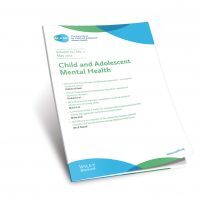Eating disorders
-

Eating Disorders: A Concern for All
Did you know that approximately 22% of children and adolescents worldwide show disordered eating? Eating Disorders Awareness Week (24 February – 2 March 2025) is an opportunity to improve awareness that anyone can have an eating disorder and explore the impact that eating disorders can have on children and young people.
This Eating Disorder Awareness Week, we encourage you to explore the FREE learning opportunities available on our website and ACAMH Learn, and to share with your networks.
Read more -

Brain differences in children who show symptoms of avoidant/restrictive food intake disorder (ARFID)
Magnetic resonance imaging (MRI) scans of children showing symptoms of avoidant/restrictive food intake disorder (ARFID) show differences in certain brain regions relative to children without ARFID symptoms. Findings from this work serve to improve our general understanding of ARFID and may help inform on ARFID-related services or our understanding of ARFID.
Read more -

Binge Eating Disorders: Executive Functioning and Treatment outcomes for Adolescents Undergoing CBT
In this In Conversation podcast, we are joined by Dr. Andrea Goldschmidt to discuss her recent JCPP paper ‘Executive functioning and treatment outcome among adolescents undergoing cognitive-behavioral therapy for binge-eating disorder’. There is an overview of the paper, methodology, key findings, and implications for practice.
Read more -

Restrictive Eating Disorders & Autism; Awareness, Advice, Actions
Booking for this event is now closed. Complex presentations of eating disorders in young people with Autism or other neurodevelopmental conditions can be challenging for professionals. We hope to provide clinicians with up to date knowledge of current research, helpful tips for clinical practice and an overview of specialist services in the northwest.
- Event type
- Webinar
- Location
- LIVE STREAM
-

Avoidant Restrictive Food Intake Disorder (ARFID): Psychological Interventions and Outcomes
In this In Conversation podcast, we are joined by Dr. Emma Willmott and Dr. Tom Jewell, from the South London and Maudsley NHS Trust and King’s College London, to discuss their recently published scoping review on psychological interventions for Avoidant Restrictive Food Intake Disorder (ARFID). This is the second episode of a two-part series on ARFID with Dr. Emma Willmott and Dr. Tom Jewell. Episode One explores ‘Avoidant Restrictive Food Intake Disorder (ARFID): Prevalence and Implications’.
Read more -

Avoidant Restrictive Food Intake Disorder (ARFID): Prevalence and Implications
In this In Conversation podcast, we are joined by Dr. Emma Willmott and Dr. Tom Jewell, from the South London and Maudsley NHS Trust and King’s College London, to discuss Avoidant Restrictive Food Intake Disorder (ARFID). This is the first episode of a two-part series on ARFID with Dr. Emma Willmott and Dr. Tom Jewell. Episode Two explores ‘Avoidant Restrictive Food Intake Disorder (ARFID): Psychological Interventions and Outcomes’.
Read more -

Performing Well but not Appreciating it – A Trait Feature of Anorexia Nervosa
In this Papers Podcast, Professor Kerstin von Plessen discusses her co-authored JCPP Advances paper ‘Performing well but not appreciating it – A trait feature of anorexia nervosa’.
Read more -

Spotlight on Eating Disorders
Eating Disorders Awareness Week (26 February – 3 March 2024) is an opportunity to bring a spotlight on eating disorders and to improve awareness of the impact that eating disorder can have on children and young people.
This Eating Disorder Awareness Week, we encourage you to explore the FREE learning opportunities available on our website, and to share with your networks.
Read more -

RESHAPE Study: Key Takeaways on Eating Disorders
In this ‘RESHAPE Study’ series episode, Professor Tamsin Ford and Clara Faria explore the findings from the ‘National Study of Health and Wellbeing: Children and Young People’ as they relate to eating disorders, and why these findings are important.
The ‘RESHAPE Study’ series is a new mini-in conversation series that will explore the RESHAPE study and the impact of its findings for parents, teachers, policymakers, and mental health professionals.
Read more -

Narrative Matters: Wasting away and fed up – dietary battles in history
Paper from the CAMH journal – ‘Histories of anorexia nervosa (AN), mostly written since the 1970s, have a standard narrative. The story is of largely Eurocentric self-starvation in adolescent girls in response to sociocultural pressures on women who are trapped in disempowering patriarchal systems.’ Jane Whittaker
Read more